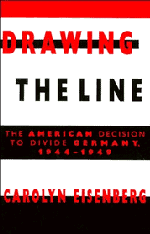Book contents
- Frontmatter
- Contents
- Preface and Acknowledgments
- Germany – Occupation Zones, 1945
- Introduction: Private Polowsky's Oath
- 1 Plans
- 2 Making Peace
- 3 The Limits of Reform: The U.S. Zone
- 4 A Fragile Friendship
- 5 The Russian Challenge
- 6 Bizonal Beginnings
- 7 The Doctors Deliberate
- 8 Marshall's Medicine
- 9 A Separate State
- 10 Cold War Germany
- 11 Winning
- Conclusion: The American Decision to Divide Germany
- Bibliography
- Index
7 - The Doctors Deliberate
Published online by Cambridge University Press: 07 October 2009
- Frontmatter
- Contents
- Preface and Acknowledgments
- Germany – Occupation Zones, 1945
- Introduction: Private Polowsky's Oath
- 1 Plans
- 2 Making Peace
- 3 The Limits of Reform: The U.S. Zone
- 4 A Fragile Friendship
- 5 The Russian Challenge
- 6 Bizonal Beginnings
- 7 The Doctors Deliberate
- 8 Marshall's Medicine
- 9 A Separate State
- 10 Cold War Germany
- 11 Winning
- Conclusion: The American Decision to Divide Germany
- Bibliography
- Index
Summary
Differences had occurred before on other questions, and as a rule after people had exhausted themselves in the dispute they then recognized the necessity of compromise. It is possible that no great success would be achieved at this session, but that should not cause anyone to be desperate.… It was necessary to have patience and not become depressed.
(Josef Stalin, Conversation with Marshall)…we cannot ignore the factor of the time involved. Disintegrating forces are becoming evident. The patient is sinking while the doctors deliberate. So I believe that action cannot await compromise through exhaustion.
(Secretary of State George C. Marshall, April 28, 1947)With the establishment of the bizone, a feeling of uncertainty hung over occupied Germany. While the country was palpably splitting in two, there had been no clear policy decision by any of the Allies that this was desirable. On the American and British sides, the forthcoming Moscow Conference of Foreign Ministers was viewed as climactic. Either the Allies would find a way to harmonize differences and reintegrate the zones, or Germany would be divided.
The rapid emergence of bizonal institutions was precipitating a choice. Over the next months, the bizone could become the foundation for a unified Germany, or a more separate and ultimately sovereign entity. Inside the British cabinet, the matter was virtually settled. The new partnership with the United States was providing the necessary confidence to attempt to exclude the Soviets from western Germany. Among American policy makers, whose responsibility for the final outcome was so much greater, there was more disquiet. The continuing pressure from Military Government to strive for German unification and to salvage eastern Germany, disrupted consensus.
Information
- Type
- Chapter
- Information
- Drawing the LineThe American Decision to Divide Germany, 1944–1949, pp. 277 - 317Publisher: Cambridge University PressPrint publication year: 1996
